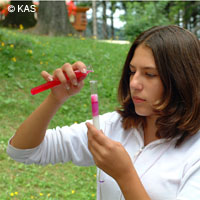Evidence of science teacher shortage presented to UK's House of Lords
'The relatively low number of specialist science teachers in the UK education system remains the single most important factor in need of improvement,' according to the Campaign for Science and Engineering (CaSE). CaSE makes the claim in response to a call for evidence on science teaching in schools from the House of Lords Select Committee on Science and Technology. The picture painted by CaSE is indeed concerning. 'The worst situation is clearly in the physical sciences and mathematics. In mathematics alone, the country is short of about 3,400 teachers, which means that even if 40 per cent of all British mathematics graduates were to become teachers for each of the next few years, there would still be barely enough to provide a good mathematical education for all pupils. In physics, about a quarter of all state secondary schools do not have any physics specialists,' states the CaSE paper. In addition, two-thirds of those who teach physics to 15- and 16-year olds do not have a degree in physics, and one third do not have an A-level (exams normally taken at 18) or equivalent. One in ten chemistry teachers for pupils aged 11 to 18 do not have any qualification in chemistry. Nine per cent of biology teachers have no biology qualification. The lack of science teachers is making a government commitment difficult to implement, says CaSE. The UK government recently pledged that all pupils who attain a certain level in the National Curriculum Tests will be entitled to study chemistry, biology and physics separately for their GCSEs - the exams usually taken at age 16. CaSE describes the aim as 'admirable in principle, but will be difficult to deliver in practice if the shortage of specialists is not reversed'. The perception that teaching as an unattractive career is responsible for the dearth in science teachers, says CaSE. Science graduates have skills that are very much in demand elsewhere. And used in industry, these skills have high earning potential. 'Strong research evidence links earnings potential with decisions about a career in teaching. To compete for good quality graduates, the teaching profession will ultimately need more than the relative 'Golden Hellos' currently on offer,' says CaSE. Other areas for improvement include keeping teachers up to date with scientific advances, improving science teaching at primary school level, recruiting more laboratory technicians, and having more practical lessons. When surveying secondary schools in England and Scotland, CaSE found that large numbers of practical classes are cancelled, the principal reasons being a lack of equipment and concerns over the behaviour of individual pupils. CaSE also proposes increasing links between schools, universities and industry, perhaps in the form of exchange secondments, allowing teachers to take a sabbatical in a laboratory, and scientists to visit schools. 'This is exactly the sort of subject-specific professional development that would benefit science teachers and which many have told CaSE they would welcome,' writes CaSE.
Countries
United Kingdom



